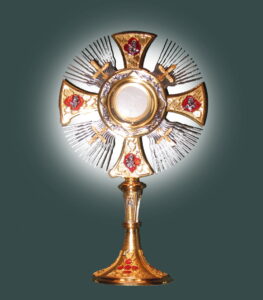 Catholics believe that during Mass, when special prayers are said over the bread and wine, they are transformed into the body, blood, soul and divinity of Jesus Christ. Thus Jesus becomes present in the consecrated bread and wine in a special way that surpasses all other forms of Christ’s presence among his people.
Catholics believe that during Mass, when special prayers are said over the bread and wine, they are transformed into the body, blood, soul and divinity of Jesus Christ. Thus Jesus becomes present in the consecrated bread and wine in a special way that surpasses all other forms of Christ’s presence among his people.
Many Christians, including some Catholics, have lost belief in the real presence of Jesus in the Eucharist. In fact this teaching is clearly supported by the Bible. (See Jesus’ promise of the Eucharist, John. 6; the institution narratives in Matthew 26: 26-28, Mark 14: 22-24, Luke 22:19-20; and warnings against abuse 1 Corinthians 11: 27-29). Some believe the mystery but do not grasp its implications or its dynamic power to impact their daily lives. Eucharistic miracles are a gift from God that recall us to the deeper meaning of this profound mystery of our faith.
Pope John Paul II started his encyclical letter on the Eucharist, “The Church of the Eucharist,” Ecclesia de Eucharistia, with the simple yet profound statement: “The Church draws her life from the Eucharist.” Jesus told us we can do nothing apart from him (John. 15:5). So, whether it is an honest day’s work, playing with the kids at the park, leading family prayer, visiting the sick, feeding the poor, or rescuing babies from abortion, it is all possible because of Jesus. It is this same Jesus who is present in the Eucharist. So whether we realize it or not, the power of Jesus in the Eucharist helps us to live out our faith. The Catechism puts it this way: “The Eucharist is the sum and summary of our faith.” (CCC 1327).
In Ecclesia de Eucharistia, the Holy Father reminds us:
“Every commitment to holiness, every activity aimed at carrying out the Church’s mission, every work of pastoral planning, must draw the strength it needs from the Eucharistic mystery and in turn be directed to that mystery as its culmination. In the Eucharist we have Jesus, we have his redemptive sacrifice, we have his resurrection, we have the gift of the Holy Spirit, we have adoration, obedience and love of the Father. Were we to disregard the Eucharist, how could we overcome our own deficiency?” (#60).
Clearly, the importance of the Eucharist to our daily lives cannot be overstated. It is one of the most important reasons for attending Mass every Sunday. When we receive Communion, we are receiving Jesus himself and he brings us graces to help us live our Christian mission fully. For this reason, many Catholics attend Mass on a daily basis even though this is not required. Catholics have also developed the practice of reserving the consecrated hosts for distribution to the sick who cannot attend Mass and for worship outside of Mass. The image to the on this page shows a special container called a monstrance, which is used to expose a consecrated host for public adoration.
The Vatican International Exhibition of Eucharistic Miracles was assembled to help reawaken or deepen our Eucharistic faith and draw us into a more intimate relationship with Jesus. This in turn will bring about a renewed commitment to, enthusiasm, and fervor for living our faith more dynamically both as individuals and as a community of believers.
